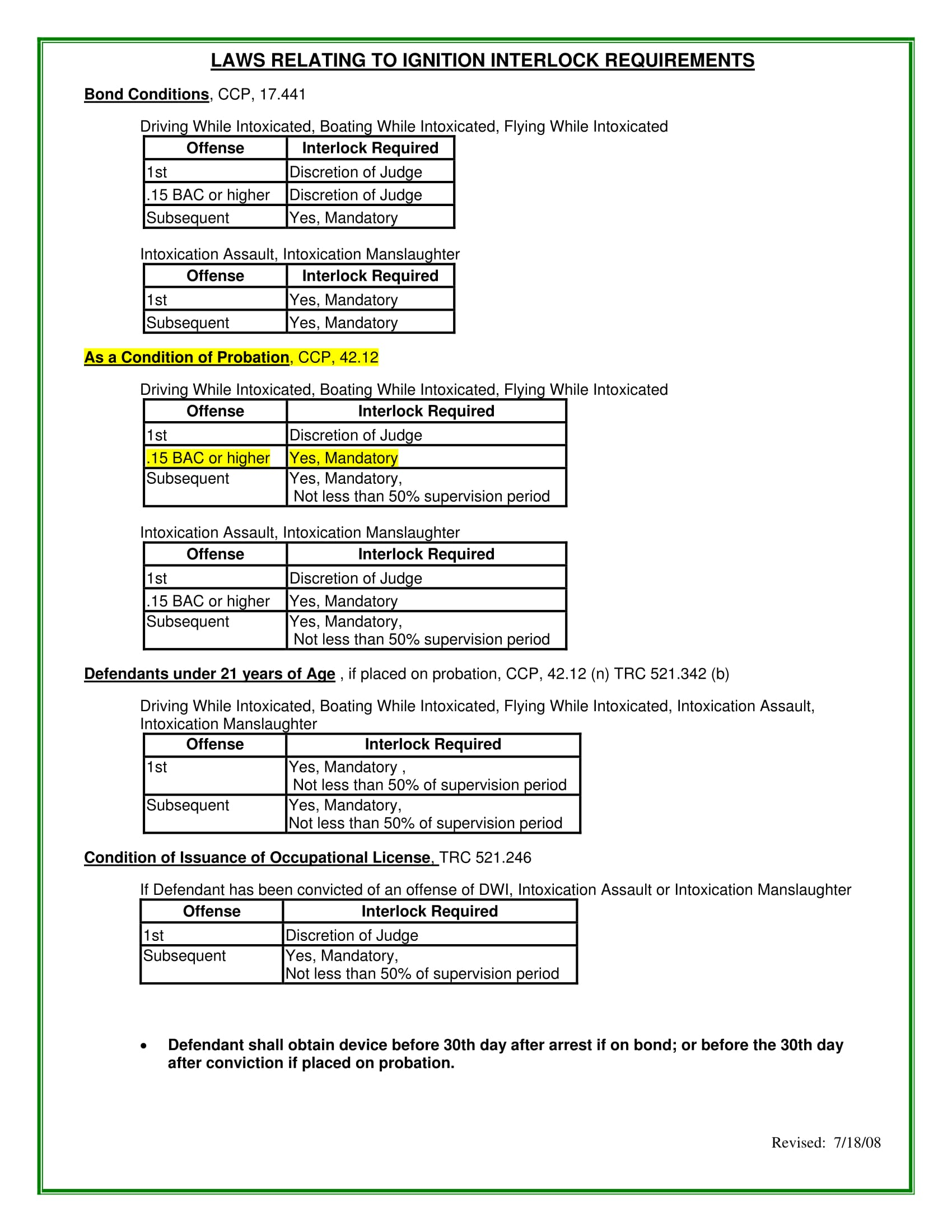Texas DWI - Conditions of Bond
I would say one of the biggest, and most frustrating experiences, that many individuals accused of DWI (especially for a 1st-offense and if the Blood-Alcohol Content (“BAC”) comes back a .15 or higher) is how ignition interlock is almost always required as a condition of bond following a DWI arrest. For a chart that details the specific law relating to ignition interlock requirements in the context of DWI arrests, please see the image below (or by clicking HERE).
Most people are familiar with the presumption of innocence. Right? Individuals are presumed innocent only if the State can prove the charges “Beyond a Reasonable Doubt” based on the in evidence and the law. Some cases are resolved after a trial (either by a Judge or Jury). Others are disposed of through a plea bargain agreement. But what about having to incur punishment and certain conditions imposed as a condition of bond that hinders certain aspects of your freedom, while charges are pending in the court system? Some cases take months, often years to resolve. Very often, the longer a case takes to dispose of, often the better the result. Often people wonder – is it really American to make one, before actually being convicted – to have to blow into some device every time they operate a motor vehicle? Innocent until proven guilty, RIGHT? After all - This is America! Not communist Russia!
If you are reading this – likely you are familiar with this frustration – and likely you may be scratching your head as to how this can be? People often ponder this scenario– “so you mean “Sally Soccer” mom, who happens to have consumed two martinis at dinner, and when driving home is arrested by a police officer who believes in their own, subjection opinion, she “lost the normal use” of her mental and/or physical faculties...may have to have ignition interlock as a requirement while her case is pending??? Which means - every time she has to drop off little Johnny at a soccer game, she will have to blow into the device to start her vehicle, pay a monthly fee to a company that profits handsomely off of this requirement, get it calibrated to ensure proper compliance, and most likely will have to meet with a pre-trial (or bond supervision officer)? The answer to all of the above is a resounding…YES!!!
What can be even more frustrating is often criminal cases take lengthy periods of time to even file by the DA’s office. The statute of limitations for misdemeanor offenses is two years. This means that “Sally Soccer” mom may have to blow into a device for two years…while out on bond…when her case isn’t even filed with the Courts and/or by the District Attorney’s Office.
Again, this perhaps is the biggest single source of frustration for many individuals we represent. To help those going through this frustration, this is article is written to communicate how this is not something that can be controlled by an attorney. It is almost universally applied in every court in the Dallas-Fort Worth Metroplex.
Conditions of Bond:
The setting of a bond, and of bond conditions, is weighted heavily toward a concern for the general community. With many other cases, including charges of DWI, courts routinely require individuals released after posting bond to meet various requirements to remain free while a case is pending. Especially in cases like Driving While Intoxicated, the courts require individuals released after posting bail to also meet certain requirements to remain free while a case is pending. This can be a frustrating proposition for an accused person who is supposedly presumed innocent. The law provides for a theoretical balance be met between the presumption of innocence and the compelling interest in requiring the accused to appear to answer the accusation against them.
Generally speaking, the following factors have been provided to trial courts in determining how to set bail, most factors listed and enforced pursuant to Article 17.15 of the Texas Code of Criminal Procedure:
- Bail should be high enough to secure the accused’s attendance in court; - Bail should not be used as an instrument of oppression;
- The nature and circumstances of the offense should be considered;
- The ability to make bail should be considered; - Future safety of a victim and/or the community should be considered;
- The accused prior work history;
- The accused’s family and community ties;
- The accused’s length of residence;
- The accused’s prior criminal record;
- The accused’s compliance with previous bond conditions;
- The existence of any other outstanding bonds;
- Aggravating circumstances surrounding the charged offense.
Obviously, given the sheer volume of the number of factors listed above, and the subjective requirements associated with each, perfectly illustrates how the law and our system places the importance of the presumption of innocence on the backburner. Just in analyzing these factors it is quite clear that the Courts lean more towards the "safety of the community" than trying to balance it against the right of the citizen accused to the presumption of innocence. In reality, the rights of the accused in the setting of bond and bond conditions, particularly when an individual is charged with a DWI, pale in comparison to those afforded through the remainder of the criminal justice process.
What is a Bond Condition?
A bail bond is legally defined as the “monetary amount for or condition of pretrial release from custody." An individual has to post an amount after being confined to secure their release from jail. The purpose of bail is to ensure the return of the accused at subsequent proceedings” - and not be used as an instrument of oppression (as outlined above). In Texas, the implementation of bail and conditions of bond under Article 17.40 of the Texas Code of Criminal Procedure, which provides a judge or magistrate with authority “to secure a defendant’s attendance at trial,” and allows the court to impose “any reasonable condition of bond related to the safety of the victim of the alleged offense or to the safety of the community.” Pretty broad criteria, right?
In other words, a judge or magistrate can require just about any condition they want. They can choose to impose whatever condition they want, as long as it does not violate a constitutional right, judicial determinations on bond conditions are rarely contested and/or reversed. In many DWI cases, as well as many other criminal offenses, typical bond conditions that arise in some but not all cases include:
- submission to random urinalysis;
- installation of a deep lung device (in DWI cases);
- ankle monitoring for drugs and alcohol; - ankle GPS monitoring.
How Can My Bondsman Create Conditions?
In addition to whatever is ordered by a court, people who utilize a bondsman instead of posting a bond in cash may be subject to additional conditions. It depends on the particular bondsman, but they can also include additional whimsical conditions if they feel it will be more certain that an individual will appear as required in court. Some bail bond companies may only require something as simple as checking in once every month by a phone call (or possibly in person), while others may require conditions a bit more onerous in nature, especially if the bondsman is particularly worried the individual may not show up for court. If the citizen accused violates the terms of their bail bond requirements, often they will attempt to "go off the bond" for a warrant to be issued for the arrest of the defendant. This is done usually to limit their liability, or maybe just because they are too lazy to make sure the people they have written a bond for are still around and have not fled the country. In these instances, a bondsman may be able to file an affidavit to surrender principal (“go off the bond”) which would result in a warrant to be issued for the immediate arrest of the defendant.
What about a 1st–offense charge of DWI (with a BAC .15 BAC or higher?
Article 17.441 of the Texas Code of Criminal Procedure indicates that a "magistrate shall require when defendant charged with a subsequent offense under the Texas Penal Code for:
1) 49.04 – DWI;
2) 49.045 – DWI Child Passenger;
3) 49.05 – Flying;
4) 49.06 – Boating;
5) an offense under: 49.07- Intoxication Assault; or 6) 49.08 – Intoxication Manslaughter.
So why is it required if it is a 1st–offense charge of DWI, but the “BAC” is above a .15? Many people wonder why it is a requirement then after an alleged first offense charge of DWI as a condition of bond when one hasn't even been to trial, MUCH LESS COURT? The answer to this is because most Judges construe Article 17.40 of the Texas Code of Criminal Procedure ("community safety"), and Article 17.441 of the Texas Code of Criminal Procedure ("the law relating to DWI and ignition interlock requirements"), as mandating ignition interlock requirements pursuant to a Defendant charged under 49.04 or 49.06 of the Texas Penal Code. Remember, Article 17.40 gives broad authority to a “magistrate to impose any reasonable condition of bond related to the safety of a victim of the alleged offense, or to the safety of the community and the Defendant.”
Texas Penal Code 49.04(d) provides “if it is shown on the trial of an offense under this section that an analysis of a specimen of the person's blood, breath, or urine showed an alcohol concentration level of 0.15 or more at the time the analysis was performed, the offense is a Class A misdemeanor.” Going back to Article 17.441 of the Texas Code of Criminal Procedure relating to the law of ignition interlock for those placed on bond (specifically referencing Texas Penal Code 49.04), Judges use this to construe this requirement to those who allegedly have a "BAC" of a .15 or higher. The best rationale I can give for this is...Judges are "nervy" people. The last thing a Judge wants is to have an individual in their court with a case pending for someone is out on bond, with an alleged "BAC" of a .15 or higher, cause a fatality under the same or similar circumstances of the first scenario that first found them in their court to begin with.
So am I on Probation Now?
I can imagine how much it would feel this way to individuals who are going through what I described above. I am writing this article because in many cases and situations for those we represent most certainly feel this way. In most counties of the Dallas-Fort Worth Metroplex, courts impose conditions of bond which typically require the accused to also report to the Pretrial Supervision Office. This is physically located in the same office as probation and run by people who do very little to help maintain the distinction.
Despite how it may feel, however, if you find yourself subject to a condition of bond, it is important to distinguish between roles as a person released on bond and a person charged with an offense. Your rights to be presumed innocent in a court of law, and to hold the State to the burden of proof beyond all reasonable doubt, still applies and are still two of the most powerful rights in our legal system. In this respect, bail/bond conditions due differ from conditions of probation (or “community supervision”) in a very important and significant way.
What is perhaps the most disparaging to me as a criminal defense practitioner is how those who may simply choose to enter into a plea bargain agreement because the post-conviction conditions may be easier to handle than those required for those on pre-trial bond. This effectually takes the presumption of innocence that we hold so sacred in our country and relegates to a very low priority. To me - it should be one of the most important rights one should have when accused of a crime and find themselves trying to navigate the criminal justice system. I understand it is an inconvenience – and genuinely have sensed the frustration in many individuals going through the process and how challenging this aspect can be. My hope is that those reading this will realize it is not something that is not particular to an individual, but is almost universally required by all similarly situated.
 />
/>






















